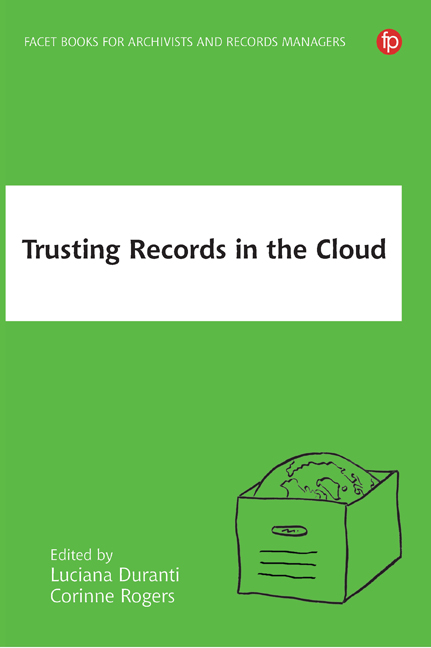Book contents
- Frontmatter
- Contents
- List of Figures and Tables
- Contributors
- 1 Introduction
- 2 The Cloud – Challenges and Issues
- 3 Open Government
- 4 Citizen Engagement
- 5 Strategies, Methods and Tools Enabling Records Governance in a Cloud Environment
- 6 Retention and Disposition
- 7 Authentication
- 8 Intellectual Control
- 9 Exploring Digital Preservation in the Cloud
- 10 Cultural Heritage – Indigenous Perspectives
- 11 The Role of the Records Professional
- 12 Education
- Appendix 1 InterPARES Trust Terminology
- Appendix 2 Products of InterPARES Trust Research
- Index
5 - Strategies, Methods and Tools Enabling Records Governance in a Cloud Environment
Published online by Cambridge University Press: 24 September 2019
- Frontmatter
- Contents
- List of Figures and Tables
- Contributors
- 1 Introduction
- 2 The Cloud – Challenges and Issues
- 3 Open Government
- 4 Citizen Engagement
- 5 Strategies, Methods and Tools Enabling Records Governance in a Cloud Environment
- 6 Retention and Disposition
- 7 Authentication
- 8 Intellectual Control
- 9 Exploring Digital Preservation in the Cloud
- 10 Cultural Heritage – Indigenous Perspectives
- 11 The Role of the Records Professional
- 12 Education
- Appendix 1 InterPARES Trust Terminology
- Appendix 2 Products of InterPARES Trust Research
- Index
Summary
Introduction
Cloud computing is currently at a very rapid stage of development. The option to outsource various aspects of informational processing is becoming standard for business and personal computing. This interest in existing cloud solutions is greater than some years ago, particularly in the context of public institutions. The diversity of services and offerings is fuelling this develop - ment, with options for cloud usage including hybrid and open source solutions. Recent studies show that cloud solutions may help institutions to optimise management of their informational resources and maximise efficiency (Makhlouf Shabou and Léveillé, 2014). McLeod and Gormly's (2017) InterPARES Trust (hereinafter ITrust) study concluded that few organizations can avoid working in the cloud.
The most appealing factor for consumers is the potential savings resulting from reduced data management and IT costs. Unlike an internal IT infrastructure, purchasing cloud options and services means that the cost of hardware and software – which would otherwise be managed by the user – is absorbed by the cloud provider; the user does not have to worry about managing infrastructure. In addition, the cloud provides economies by operating at a larger scale. This facility can also be seen as problematic as it gives an external entity/service the ability to control corporate data and records and their availability and security. However, proper records management and information governance can counterbalance this with a range of options in terms of how the institution maintains control of its data and records. It is important to recognise that key risks are not transferred from the records creator to the service provider; for example, data protection responsibilities in an EU context remain the responsibility of the creator. A Service Level Agreement (SLA) should be tailored to consider the best conditions to favour appropriate corporate records governance that fits to business needs and priorities.
This chapter draws together key ITrust initiatives on strategies, methods and tools enabling records governance to be applied in a cloud environment. The first section presents the role and quality of recordkeeping policies in the context of the European Union, considering on the one hand recent legislative evolutions and, on the other, the cloud solutions. The second section presents the leveraging of enterprise architecture for efficient management of complex records corporate realities. The third section compares records governance and maturity assessment methods and tools and offers some practical answers.
Information
- Type
- Chapter
- Information
- Trusting Records and Data in the Cloud , pp. 97 - 116Publisher: FacetPrint publication year: 2018
Accessibility standard: Unknown
Why this information is here
This section outlines the accessibility features of this content - including support for screen readers, full keyboard navigation and high-contrast display options. This may not be relevant for you.Accessibility Information
- 1
- Cited by
